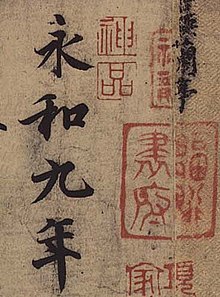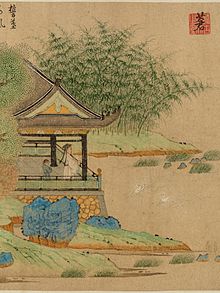Wang Xizhi
| Surname | |
|---|---|
| Chinese: | 王羲之 |
| Pinyin : | Wáng Xīzhī |
| Wade-Giles : | Wang Hsi-chih |
| Artist name (Zi): | Yìshào (逸少) |
| Artist name (Hao): | Dànzhāi (澹 斋) |
| Other names: | Shūshèng (書 聖, literally saint of calligraphy) |

Wang Xizhi ( Chinese 王羲之 ; * 307 in today's Shandong Province ; † 365 ), born in the final phase of the Western Jin Dynasty , is one of the most important Chinese calligraphers. His most famous work is the foreword to the collection of poems from the Orchid Pavilion .
The two outstanding masters of Chinese calligraphy , Wang Xizhi and his son Wang Xianzhi (344–386), who laid the foundations not only in terms of script theory, but also in the further development of Chinese writing, were already living in the 4th century.
Wang Xizhi expresses himself about his art in the following words, referring to the "eight principles of the character 永 " ( 永字八法 , Yǒngzì Bāfǎ ):
“ Every horizontal line is a cloud pile in battle order; each tick is a bow of great elasticity; each point is a rock falling from the top; every curve is a dry wine smell of old age; every quick, free line is a runner at the start. "
biography
Wang Xizhi had seven sons and one daughter. Except for one son who died early, all sons became calligraphers. The most famous among them was the youngest son, Wang Xianzhi .
Wang Xizhi came from a noble family . His grandfather and father held high positions at court. The family was best known for their calligraphers. Of the hundred or so calligraphers from the Jin Dynasty known by name , twenty belong to the Wang family. Wang Xizhi himself learned first from his father and later from the famous calligrapher Wei Shuo .
Wang Xizhi also initially held an office. However, he was offended by his supervisor, fell ill and resigned from his job. At his parents' grave he swore that he would never work as a civil servant again. During his life, Wang Xizhi wrote thousands of calligraphy, but not a single original has survived. The copies are all from texts engraved according to his originals, of which there are about a dozen.
Web links
| personal data | |
|---|---|
| SURNAME | Wang Xizhi |
| BRIEF DESCRIPTION | chinese calligrapher |
| DATE OF BIRTH | 307 |
| PLACE OF BIRTH | present-day Shandong Province , China |
| DATE OF DEATH | 365 |
